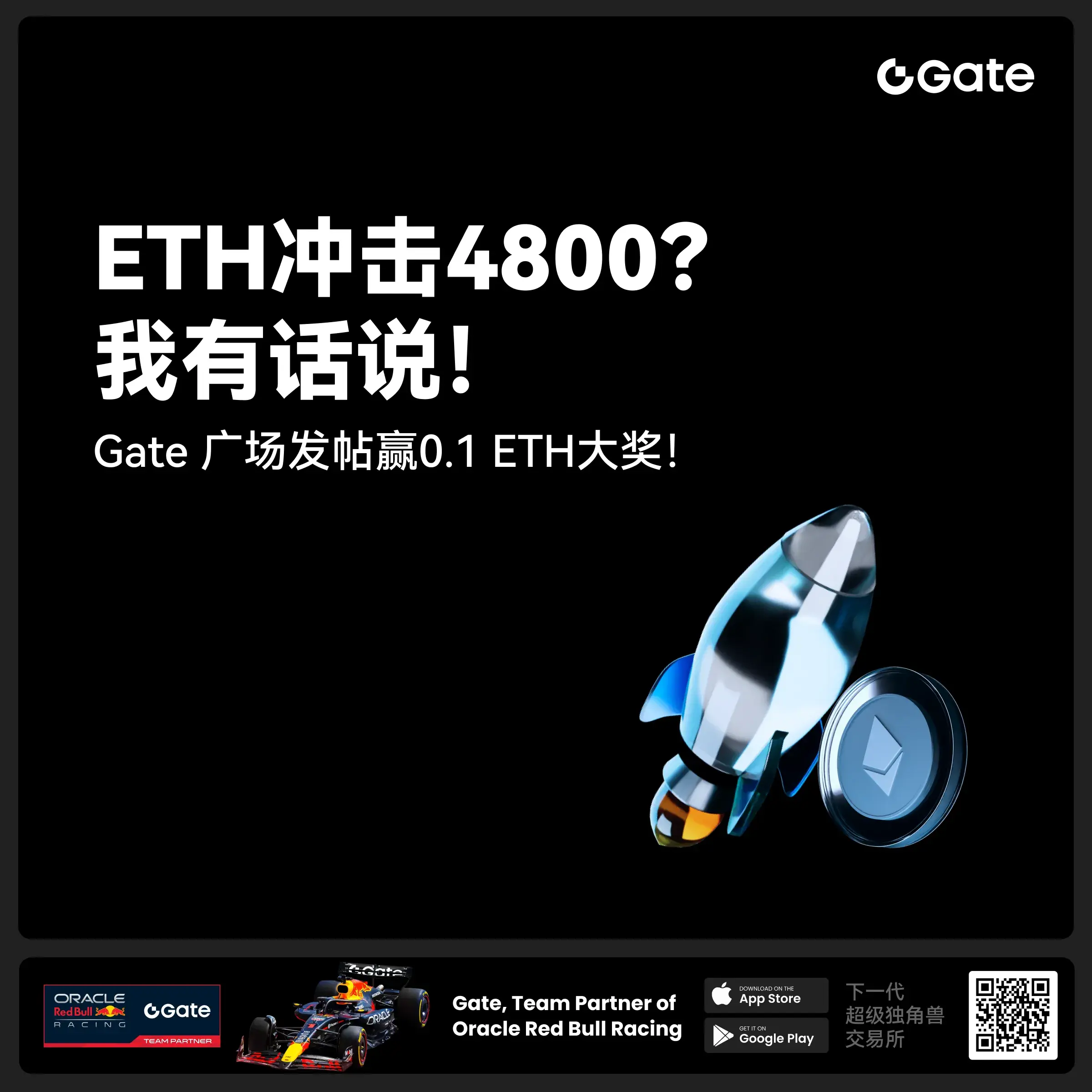- 话题
38127 热度
18964 热度
42907 热度
47097 热度
16305 热度
18876 热度
6524 热度
3277 热度
96943 热度
- 10我的Gate时刻
28283 热度
- 置顶
- 🧠 #GateGiveaway# - 加密算术题挑战!
你能解出这道加密题吗?
💰 $10 合约体验券 * 4 位获奖者
参与方式:
1️⃣ 关注 Gate广场_Official
2️⃣ 点赞此条动态贴文
3️⃣ 在评论中留下你的答案
📅 截止时间:7 月 22 日 12:00(UTC+8)
- 📢 ETH冲击4800?我有话说!快来“Gate广场”秀操作,0.1 ETH大奖等你拿!
牛市预言家,可能下一个就是你!想让你的观点成为广场热搜、赢下ETH大奖?现在就是机会!
💰️ 广场5位优质发帖用户+X浏览量前5发帖用户,瓜分0.1 ETH!
🎮 活动怎么玩,0门槛瓜分ETH!
1.话题不服来辩!
带 #ETH冲击4800# 和 #ETH# 在 广场 或 K线ETH下 围绕一下主题展开讨论:
-ETH是否有望突破4800?
-你看好ETH的原因是什么?
-你的ETH持仓策略是?
-ETH能否引领下一轮牛市?
2. X平台同步嗨
在X平台发帖讨论,记得带 #GateSquare# 和 #ETH冲击4800# 标签!
把你X返链接提交以下表单以瓜分大奖:https://www.gate.com/questionnaire/6896
✨发帖要求:
-内容须原创,字数不少于100字,且带活动指定标签
-配图、行情截图、分析看法加分,图文并茂更易精选
-禁止AI写手和灌水刷屏,一旦发现取消奖励资格
-观点鲜明、逻辑清晰,越有料越好!
关注ETH风向,创造观点价值,从广场发帖开始!下一个牛市“预言家”,可能就是你!🦾🏆
⏰ 活动时间:2025年7月18日 16:00 - 2025年7月28日 23:59(UTC+8)
【立即发帖】 展现你的真知灼见,赢取属于你的ETH大奖!
- 🎉 #Gate Alpha 第三届积分狂欢节 & ES Launchpool# 联合推广任务上线!
本次活动总奖池:1,250 枚 ES
任务目标:推广 Eclipse($ES)Launchpool 和 Alpha 第11期 $ES 专场
📄 详情参考:
Launchpool 公告:https://www.gate.com/zh/announcements/article/46134
Alpha 第11期公告:https://www.gate.com/zh/announcements/article/46137
🧩【任务内容】
请围绕 Launchpool 和 Alpha 第11期 活动进行内容创作,并晒出参与截图。
📸【参与方式】
1️⃣ 带上Tag #Gate Alpha 第三届积分狂欢节 & ES Launchpool# 发帖
2️⃣ 晒出以下任一截图:
Launchpool 质押截图(BTC / ETH / ES)
Alpha 交易页面截图(交易 ES)
3️⃣ 发布图文内容,可参考以下方向(≥60字):
简介 ES/Eclipse 项目亮点、代币机制等基本信息
分享你对 ES 项目的观点、前景判断、挖矿体验等
分析 Launchpool 挖矿 或 Alpha 积分玩法的策略和收益对比
🎁【奖励说明】
评选内容质量最优的 10 位 Launchpool/Gate - 和其他领域不一样的是:你想支持一个 Web3 游戏项目,你必须要「双投」——既要投时间,也要投钱。

- 🎉【Gate 3000万纪念】晒出我的Gate时刻,解锁限量好礼!
Gate用户突破3000万!这不仅是数字,更是我们共同的故事。
还记得第一次开通账号的激动,抢购成功的喜悦,或陪伴你的Gate周边吗?
📸 参与 #我的Gate时刻# ,在Gate广场晒出你的故事,一起见证下一个3000万!
✅ 参与方式:
1️⃣ 带话题 #我的Gate时刻# ,发布包含Gate元素的照片或视频
2️⃣ 搭配你的Gate故事、祝福或感言更佳
3️⃣ 分享至Twitter(X)可参与浏览量前10额外奖励
推特回链请填表单:https://www.gate.com/questionnaire/6872
🎁 独家奖励:
🏆 创意大奖(3名):Gate × F1红牛联名赛车模型一辆
👕 共创纪念奖(10名): 国际米兰同款球员卫衣
🥇 参与奖(50名):Gate 品牌抱枕
📣 分享奖(10名):Twitter前10浏览量,送Gate × 国米小夜灯!
*海外用户红牛联名赛车折合为 $200 合约体验券,国米同款球衣折合为 $50 合约体验券,国米小夜灯折合为 $30 合约体验券,品牌抱枕折合为 $20 合约体验券发放
🧠 创意提示:不限元素内容风格,晒图带有如Gate logo、Gate色彩、周边产品、GT图案、活动纪念品、活动现场图等均可参与!
活动截止于7月25日 24:00 UTC+8
3
Navigating the Fragmented Travel Industry and How Blockchain Can Help
From the outside looking in, the travel ecosystem that is in place today is an amalgamation of many different types of service offerings, such as booking platforms, itinerary curators, and expense planners, among others
That said, the sector is extremely fragmented such that it is largely controlled by the monopolistic tendencies of a few players such as Hotels.com, Bookings.com, Agoda, etc. And while many of these platforms claim to deliver highly streamlined booking processes — including flight/hotel reservations, car rentals, etc. — the ground reality is, in fact, quite different.
For starters, many of these platforms offer visual formats that are extremely cluttered and confusing. Not only that, sometimes the volume of information applied by them is quite overwhelming for users, especially those users who may not be that tech savvy. Moreover, a lot of platforms do not include deals or packages from their associates since they are in direct competition with them. This results in a dearth of comprehensive options, often forcing travelers to keep going from one website to another
Transparency is another key area of concern. This is because Web2 travel platforms, more often than not, hide heavy fees and peripheral surcharges while providing no real guarantee regarding the safety of one’s data. In fact, there is enough data to suggest that these platforms have routinely compromised sensitive information — such as credit card numbers, addresses, phone numbers, and personal IDs — of their clients
Lastly, since most centralized platforms suffer from inventory constraints — thanks to their reliance on third parties — today’s booking processes are not only time exhausting but also quite expensive
Potential Solutions and Innovations
In the face of these problems, a question that is bound to arise in the minds of many is, “Can these problems ever be tackled in a resourceful way?” The answer may lie with blockchain tech and the travel industry’s need to rearm itself with tools based on this technology
To elaborate, by making use of decentralized ledgers, travel platforms can resolve several of the issues mentioned above, especially those pertaining to accountability, transparency, privacy, and data security
Enter Camino Network, a blockchain travel solution that has been developed by Chain4Travel AG, offering clients holistic means of resolving the several bottlenecks stifling the travel industry’s growth potential. The platform’s key USP is its overall versatility, i.e. it presents travelers with a robust network of services that, instead of competing with today’s travel ecosystem
This flexibility has allowed for the creation of numerous travel-related offerings that are set to revamp the ways in which new travel-related products can be created and how people can interact with the industry. Also, because Camino uses a consurtium design for governance, it is being operated, maintained, and governed by the travel industry for the travel industry
Another standout aspect of Camino Network is that it is able to mitigate transaction fees by a huge margin. As a result, travelers will no longer have to bear heavy processing and handling charges. This is achieved via the removal of any middlemen or agents that accrue a significant cut for themselves before allowing for a booking to be finalized. Such cost-effectiveness not only serves as a major plus for consumers but also for the industry at large.
In terms of trust, Camino Network’s use of a blockchain setup ensures that all transactions — monetary and otherwise — are maintained in a secure and transparent fashion. Governance-wise, the platform puts all the power back in the hands of its consortium members, a democratic approach that helps ensure that Camino always retains its reasonable transaction fee model while also helping in the constant development of new and improved travel products.
The Future of the Travel Industry
As more people become accustomed to the use of blockchain technology, there is reason to believe that the travel industry will continue to grow and thrive, an assertion that is backed by factual data. For example, a recent study notes that the realm of business travel alone — a major part of today’s travel ecosystem — will grow from US$665.3 Billion to US$928.4 Billion by 2030
Thus, as the travel landscape evolves and matures, offerings like the Camino Network will play undoubtedly play a large role in its growth. By leveraging the power of a decentralized ledger, it is possible to create more efficient, transparent, and user-friendly platforms that meet the needs of modern travelers. Thus, it will be interesting to see how things pan out from here on end.